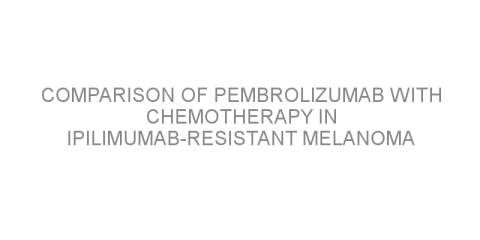In a nutshell The authors compared the safety and effectiveness of pembrolizumab (Keytruda) to chemotherapy for the treatment of ipilimumab (Yervoy)-resistant melanoma. Some background Ipilimumab, an immunotherapy (treatment that uses the body’s own immune system to fight cancer), is an approved drug for the...
Read MoreOngoing treatment(s)-Chemotherapy Posts on Medivizor
Radiation to the lymph nodes in stage II and II breast cancer; is it necessary?
In a nutshell The authors aimed to assess the effectiveness of radiotherapy treatment (uses high-energy radiation to kill cancer cells by damaging their DNA) on women with breast cancer who have previously had surgery. Some background Breast- conserving surgery (removes the breast cancer but not the breast itself) is just one method of breast...
Read MoreAdvances in post-surgery radiation; what are the effects on breast cancer?
In a nutshell The authors aimed to study the effects of a type of post-surgical radiation; radiation to only the affected area of the breast. Some background Radiation is a type of cancer treatment that is recommended following a lumpectomy (removal of the tumor and some surrounding tissue; breast remains intact). 'Brachytherapy' is...
Read MoreChemotherapy before surgery; is there a different in outcome between different types of breast cancer?
In a nutshell The authors aimed to evaluate if the outcomes of surgery following chemotherapy are different based on the focality of breast cancer tumors. Some background Breast cancer can be characterised as 'unifocal', 'multifocal and 'multicentric'. This refers to the number of areas in which the cancer can be found...
Read MoreThe effects of chemotherapy on thyroid function
In a nutshell The authors aimed to assess whether chemotherapy has an impact on thyroid function. Some background The thyroid is an endocrine gland (tissue that releases hormones) found in the neck. It controls how quickly the body uses energy used in the body, how the body reacts to other hormones and makes proteins. Thyroid hormones can...
Read MoreCan we estimate the benefit of vandetanib and docetaxel in advanced non-small cell lung cancer?
In a nutshell The aim of this study was to determine whether the benefit from combination therapy of vandetanib (Caprelsa) and docetaxel (Taxotere) could be linked to specific biological substances in non-small cell lung cancer (NSCLC) patients. Some background In advanced stage (IIB/IV) NSCLC, cancer may spread throughout lungs and to other...
Read MoreBenefits of personalized dosing of 5-fluorouracil: decreased side effects and improved outcomes
In a nutshell This study evaluated the benefits of personalized 5-fluorouracil (Efudex) dosing in early and late-stage colorectal cancer patients. Some background 5-fluorouracil has been a mainstay of colorectal cancer chemotherapy for over 50 years. Research has shown that in order for 5-fluorouracil to work effectively target concentrations need...
Read MoreChemoradiotherapy reduces physical fitness in rectal cancer patients waiting for surgery
In a nutshell This small study investigated the effect of neoadjuvant chemoradiotherapy on whole-body physical fitness. Some background Locally advanced rectal cancer indicates that the cancer has spread beyond the lining of the rectum or has spread to the nearby lymph nodes. Patients with locally advanced rectal cancer routinely receive...
Read MoreBlood protein levels could predict benefit of gefitinib in patients with advanced disease
In a nutshell This study investigated using levels of the proteins MUC1 and VEGF to predict the benefit of gefitinib in patients with advanced NSCLC. Some background Non small-cell lung cancer (NSCLC) is a common type of lung cancer that can be difficult to treat. 65-75% of cases are presented at an advanced stage. Chemotherapy is often...
Read MoreDetecting chemoresistance before treatment
In a nutshell This analysis explored whether class 3 β-tubulin levels are associated with chemoresistance in non-small cell lung cancer. Some background Non-small cell lung cancer often has no symptoms in the early stages, and therefore is often diagnosed at later stages. Despite treatment advances, the outlook for later-stage non-small cell...
Read MoreCan more radiation help?
In a nutshell This study focused on the effectiveness of thoracic radiotherapy in treating extensive stage small-cell lung cancer. Some background Small-cell lung cancer (SCLC) is a fast growing cancer that has a tendency to spread to other parts of the body like the brain, liver and bone. Often, SCLC has already spread to the brain even if...
Read More“Chemobrain” improves following the end of treatment
In a nutshell This study measured the long-term effects of chemotherapy on cognitive function in breast cancer patients. Some background As increasing numbers of breast cancer patients are surviving for years following treatment, it is becoming more important to understand the long-term effects of these treatments. Cognitive (mental processing)...
Read More













